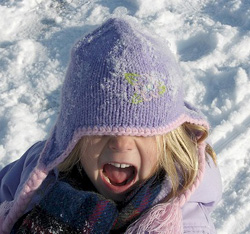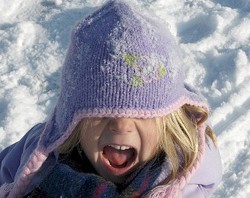Snow Blindness: Nordic Natasha’s Newsletter Tip of the Month
 Sunny days are the most enjoyable for skiers. But remember! You must protect your eyes! In the winter, your eyes are exposed to light from above and below when it’s reflected up off the snow. This doubles the intensity of ultraviolet rays. Prolonged exposure can actually burn your eyes and eventually cause snow blindness. Symptoms of snow blindness include pain in the eyes and extreme sensitivity to light. With a good pair of sunglasses you can protect your eyes from both the sun and the wind. Avoid sunglasses with metal frames that are cold against your face. Be sure your lenses have the proper UV protection. For the best protection, choose sunglasses that block UVA and UVB rays between 290 and 400 nanometers (nm).
Sunny days are the most enjoyable for skiers. But remember! You must protect your eyes! In the winter, your eyes are exposed to light from above and below when it’s reflected up off the snow. This doubles the intensity of ultraviolet rays. Prolonged exposure can actually burn your eyes and eventually cause snow blindness. Symptoms of snow blindness include pain in the eyes and extreme sensitivity to light. With a good pair of sunglasses you can protect your eyes from both the sun and the wind. Avoid sunglasses with metal frames that are cold against your face. Be sure your lenses have the proper UV protection. For the best protection, choose sunglasses that block UVA and UVB rays between 290 and 400 nanometers (nm).

